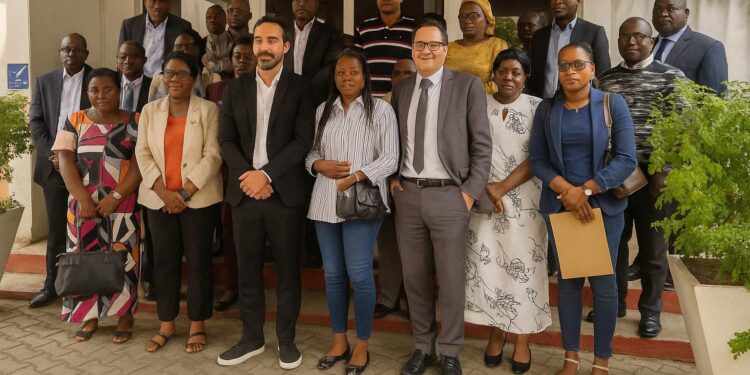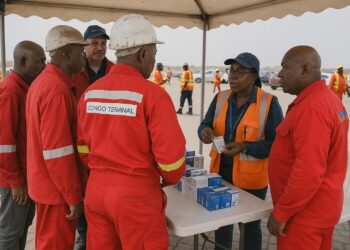Training sharpens EITI form mastery in Pointe-Noire
In Pointe-Noire, Congo’s commercial capital, senior staff from petroleum, mining and forestry companies gathered on 4 September 2025 for an intensive training workshop on the newly redesigned disclosure templates of the Extractive Industries Transparency Initiative, or EITI. The session followed a similar event recently organised in Brazzaville.
Facilitators outlined the purpose of the forms that will underpin the Congo 2023 EITI Report, scheduled for publication in December. Participants reviewed changes introduced by the 2023 EITI Standard, including enhanced guidance on data collection, step-by-step completion instructions and tighter deadlines for submitting revenue and payment information.
Private sector’s strategic place in transparency drive
Opening the session by video link, Florent Michel Okoko, Permanent Secretary of Congo’s national EITI committee, reminded executives that private operators form “the third essential link” alongside government and civil society. He stressed that accurate declarations unlock the value of resources that finance national development priorities.
Trainer Karim Lourimi highlighted that the forthcoming report marks Congo’s transition to the new global standard and will frame preparations for the country’s next validation in January 2027. The workshop forms part of a World Bank-funded programme, “Accelerating Institutional Governance and Sustainable Service Delivery”.
Key changes under the 2023 EITI Standard
Under the EITI framework, companies disclose taxes, royalties and social contributions while state entities declare receipts, enabling reconciliation by an independent administrator. Pointe-Noire, home to offshore oil platforms and the terminal of the Mayombe iron ore corridor, is central to the datasets that will feed the 2023 cycle.
The 2023 Standard introduces new expectations on beneficial ownership, contract publication and energy transition disclosures. Facilitators noted that Congo already publishes mining and petroleum contracts online, yet managers were encouraged to verify annexes covering production sharing, cost-recovery thresholds and social clauses before uploading data into the portal.
Sector-specific reporting challenges and solutions
Questions from forestry firms focused on how to quantify reforestation levies and community development funds, items sometimes paid in kind. Trainers advised converting volumes of seedlings or road maintenance hours into monetary equivalents using guidance annexed to the standard, thereby maintaining comparability with cash contributions registered by hydrocarbon operators.
Several mining delegates sought clarity on reporting export duties amid fluctuating global prices. Facilitators pointed to the requirement to disclose both reference prices and realised values, allowing analysts to assess revenue sensitivity. They underscored that accurate commodity codes facilitate consistency with customs statistics later reconciled by the independent administrator.
For oil companies, the main novelty concerns detailed project-level reporting of greenhouse gas emissions associated with production and transport. Representatives of offshore consortia welcomed the chance to align EITI disclosures with internal ESG dashboards, noting that investors increasingly request harmonised climate metrics when negotiating facility extensions or reserve-based lending.
Financing and capacity-building implications
Bankable data remain a cornerstone for lenders such as the Development Bank of Central Africa and regional pension funds that co-finance infrastructure. By strengthening data quality, organisers argued, the new templates could lower perceived governance risk premia, translating into more competitive financing for pipelines, ports and renewable mini-grids.
The World Bank’s support covers technical assistance, cloud storage and translation of guidance into French and kituba to widen accessibility. According to facilitators, similar sessions are planned for Ouesso and Dolisie to ensure that timber concessions and emerging lithium projects adopt the same compliance culture ahead of the December deadline.
Stakeholder reactions and political signals
Participants left with digital copies of the forms and a direct hotline to the national secretariat for troubleshooting. “We now have a clearer framework and timeline,” said a legal adviser at an international operator, adding that the extra month of preparation could prevent last-minute adjustments that previously generated reconciliation gaps.
Civil society coalitions, though absent from this corporate-focused workshop, welcomed the initiative in a joint statement circulated the following day. They urged companies to publish gender-disaggregated employment figures alongside fiscal data, arguing that transparency on workforce composition complements financial disclosure and feeds into national debates on inclusive growth.
Government officials observing the training underlined that compliance is voluntary yet politically significant. A senior Ministry of Hydrocarbons inspector noted that the presidency pays close attention to timely submissions because they reinforce investor confidence and portray Congo as a cooperative partner in resource-governance networks such as OPEC and COP summits.
Timeline toward report delivery and validation
Next steps include a pilot reconciliation of second-quarter 2025 payments using the new layouts, allowing any formatting bugs to be fixed before the national independent administrator launches data assurance procedures in November. The national secretariat will then compile contextual narratives on production, revenue allocation and socioeconomic spending trends.
By aligning corporate disclosures with evolving international best practice, Pointe-Noire’s operators aim to contribute to a robust 2023 EITI report that underpins Congo’s credibility with creditors and rating agencies while supporting the resource mobilisation objectives set by the government’s 2022-2026 National Development Plan.
Industry representatives will reconvene in December to review final reconciliations before publication.












































